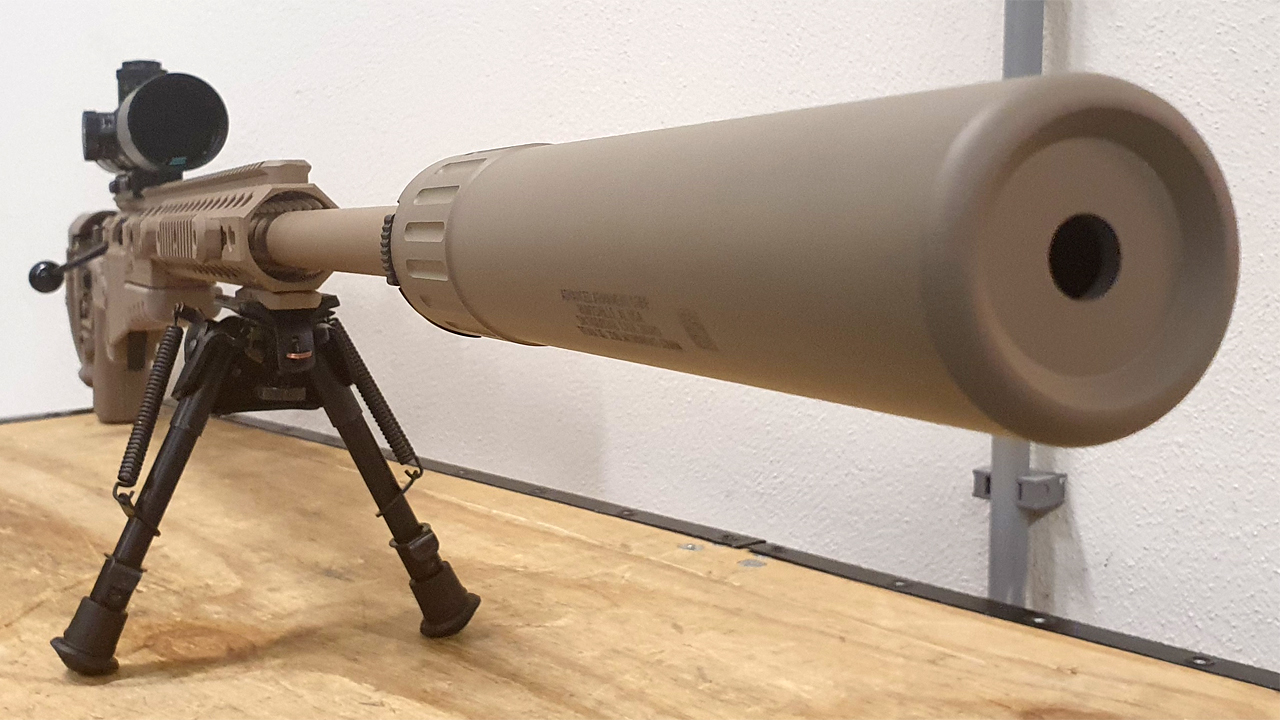Suppressor on a rifle, image from Dutch Ministry of Defense website
The biggest thing to happen to Lubbock area guns shops in a while is an explosion of suppressor sales this year. The increase comes from quicker approvals of applications to own suppressors by the Bureau of Alcohol Tobacco and Firearms (ATF).
Gun owners generally buy suppressors to protect their hearing when shooting.
Applications often take days – not months – for approval. That’s a change from several months ago.
“Just this year, we’ve had to have doubled what we did last year already,” said Sky Stracener, owner of SS Outfitters in Levelland. “If you own a gun shop that sells silencers, it’s been probably the biggest form of revenue for your shop … I can think of three other shops in Lubbock, just blow up on selling suppressors.”
Silencer vs. suppressor
The Bureau of Alcohol Tobacco and Firearms (ATF) refers to these devices as silencers. Historically that’s what they were called. But firearms professionals call them suppressors. They’re the same thing.
The devices suppress the sound of gunshots, and that reduces the risk of hearing loss for shooters.
“The market’s been kind of flooded with guns, and a lot of people are kind of topped off on those, it seems like. But the suppressor deal has just gone through the roof because of the wait times,” Stracener said.
Knox Williams, president and executive director of the American Suppressor Association (ASA), tracks the wait times.
“According to our friends at Silencer Shop, the wait range for their customers applying as individuals is anywhere from 1 day to 6 months with a median wait of just 3 days – a decrease of 10 days since last month,” Williams said in an August 12 Youtube Video.
Why the change
The ASA lobbied the ATF to begin using electronic forms for suppressor applications. In March, the federal regulators announced an eForm system. Wait times for individuals dropped dramatically. However, some people prefer to apply using a trust. Trust applications are still running slow.
A trust is a legal arrangement for someone (called a trustee) to hold something of value on behalf of a beneficiary. Often, it’s easier to pass down firearms as an inheritance through a trust instead of probate.
Williams said, “For trusts, the wait range is 2 days to 7 months with a median wait of 107 days.”
“The people that are still selecting to do it as a trust, it’s still taking a few months,” Stracener said. “The individual route has by far been the fastest.”
Applying as an individual might get delayed.
Stracener said, “It’s not a guaranteed 2-or-3-day wait time or turn around. Approval can still take some time. It can still take months. It all depends.”
It “all depends” on a criminal background check; some gun owners are getting instant results.
“Those are our customers that are getting approved in two or three days to a week,” Stracener said.
Right to bear quieter arms
A suppressor is regulated the same way as a firearm in federal law. That means, generally, a licensed firearm dealer cannot sell a suppressor without first doing a background check on the customer in NICS or the National Instant Criminal Background Check System.
Stracener thinks that’s not right.
“Why are we having to register these, and pay a $200 tax on something that’s really not even a firearm? I mean, this is just a piece of pipe with a hole in the baffle that just makes your gun a little bit quieter,” Stracener said.
For Stracener, safety is the issue.
The American Speech-Language-Hearing Association said, “People who use firearms are more likely to develop hearing loss than those who do not.”
Stracener said a suppressor brings down the sound about 30 decibels, depending on the firearm.
“Higher-caliber rifles can produce sounds over 175. … It’s crucial to understand that exposure to noise greater than 140 … can permanently damage hearing, even from a single occurrence,” the association said.
Stracener said, “Makes it safer for you to shoot because you’re not ruining your hearing.”
But it’s not as quiet as you see in the movies.
“Just that little pop that you hear in the movies. I mean, they’re louder than that,” Stracener said.
The idea of gun owners trying to be sneaky, he said, is just nonsense.
“The biggest thing that’s pushing people is shooting around kids, their grandkids, and then, on hunting trips with friends – just not having to worry about ear protection,” Stracener said.
He has ringing in his ears from shooting years ago without hearing protection on a hunting trip. A suppressor might have made the sound less dangerous.
“These things should not be regulated,” he said.
Cost and other considerations
“The good ones are $600 and up,” Stracener said about the cost of a suppressor. “They can go all the way up to $2,000.”
He mentioned the $200 tax which comes in the form of a tax stamp that’s been around since 1934.
“Nobody ever seems to be getting mad about the tax near as much as you’d think. They just said, ‘I don’t care about the tax. I’d almost pay more if I could just get it today,’” Stracener said.
The suppresser is both good and bad for the gun.
“You will get a little bit more velocity,” Stracener said. So the bullets go faster and the gun has less recoil.
Accuracy is still good with a suppressor. There is one drawback.
“It makes the gun dirty,” Stracener said. The suppressor can hold back unburned gun powder in the barrel.
“So, you have to clean the gun a little bit more,” he said.
Comment, react or share on our Facebook post.


 Facebook
Facebook